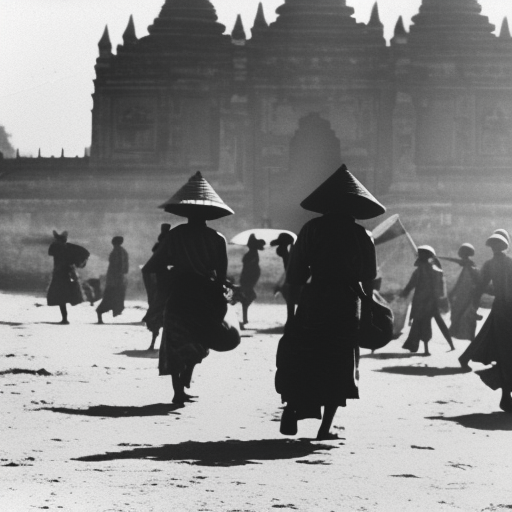The Burma Campaign: A Struggle for Control
The Burma Campaign, also known as the Burma-India Campaign, was a series of military operations fought during World War II between the Allied forces and the Japanese Empire. The campaign took place in Burma (now Myanmar) and its surrounding regions from 1942 to 1945. It was a crucial theater of war, as control of Burma was vital for both sides in their efforts to secure dominance in Southeast Asia.
The Japanese Invasion
The campaign began in 1942 when the Japanese launched a surprise invasion of Burma. Their objective was to secure the country’s resources, establish a land route to India, and cut off the Allied supply lines to China. The Japanese quickly overwhelmed the ill-prepared British and Indian forces, forcing them to retreat to India. The fall of Burma was a significant blow to the Allies, as it disrupted their supply chain and threatened their position in Southeast Asia.
The Chindits and the Long Range Penetration Strategy
In response to the Japanese invasion, the British formed a special force known as the Chindits. Led by Major General Orde Wingate, the Chindits were tasked with conducting long-range penetration operations behind enemy lines. They aimed to disrupt Japanese supply lines, gather intelligence, and raise local resistance against the invaders. The Chindits’ unconventional tactics and their ability to operate deep in enemy territory made them a formidable force.
The Battle of Imphal and Kohima
One of the turning points in the Burma Campaign was the Battle of Imphal and Kohima in 1944. The Japanese launched a major offensive to capture the strategic towns of Imphal and Kohima, which would have given them control over the region. However, the Allied forces, consisting of British, Indian, and Gurkha troops, successfully defended these positions in a grueling battle that lasted for several months. The Japanese suffered heavy casualties and were forced to retreat, marking a significant setback for their campaign in Burma.
The Fourteenth Army and the Reconquest of Burma
Following the victory at Imphal and Kohima, the Allies launched a counteroffensive to retake Burma. The Fourteenth Army, under the command of General William Slim, played a crucial role in this campaign. The Fourteenth Army was a multinational force consisting of British, Indian, African, and Gurkha troops. They employed a combination of conventional warfare, guerrilla tactics, and air support to push the Japanese back.
The Battle of Meiktila and Mandalay
In 1945, the Fourteenth Army launched a major offensive to capture the key cities of Meiktila and Mandalay. The Battle of Meiktila was a decisive engagement, as the Allies successfully encircled and defeated the Japanese garrison, cutting off their retreat route. With the fall of Meiktila, Mandalay soon followed, and the Japanese forces in Burma were in disarray.
The End of the Burma Campaign
The Burma Campaign came to an end in August 1945, following the Japanese surrender. The Allies had successfully driven the Japanese out of Burma and regained control of the region. The campaign was a significant victory for the Allies, as it not only secured their position in Southeast Asia but also played a crucial role in the overall defeat of Japan in World War II.
Legacy of the Burma Campaign
The Burma Campaign had a lasting impact on the region. It exposed the vulnerability of the Japanese Empire and demonstrated the effectiveness of the Fourteenth Army’s tactics. The campaign also highlighted the contributions of the Indian, African, and Gurkha troops, who fought alongside the British forces. Additionally, the Burma Campaign played a role in shaping the post-war political landscape in Burma, eventually leading to the country’s independence from British rule in 1948.
In conclusion, the Burma Campaign was a significant theater of war during World War II. The Japanese invasion of Burma was met with fierce resistance from the Allied forces, culminating in the successful reconquest of the region. The campaign showcased the bravery and determination of the soldiers involved and had far-reaching consequences for the countries involved.












